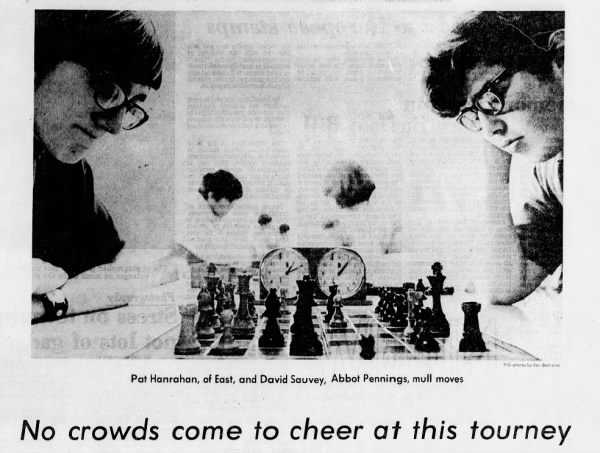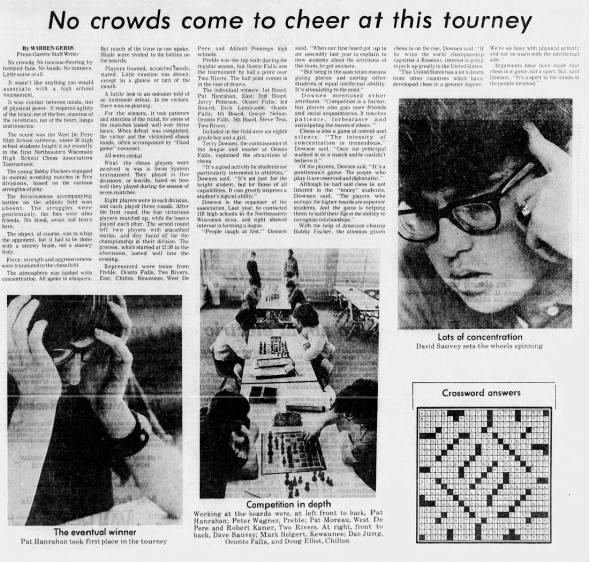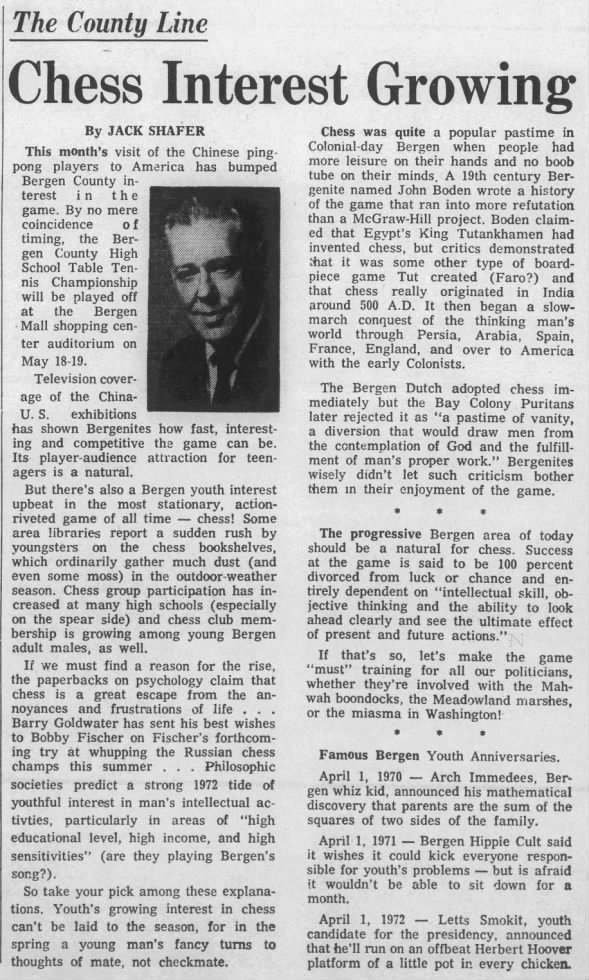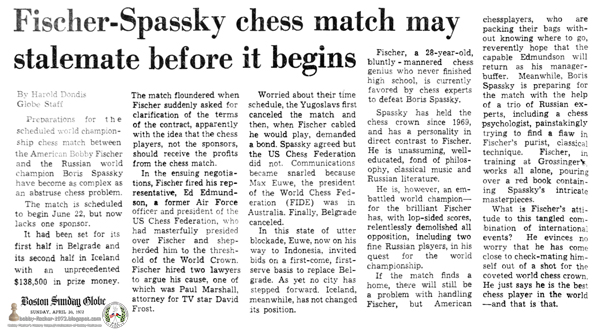The Sydney Morning Herald Sydney, New South Wales, Australia Sunday, April 30, 1972 - Page 93
Now It's Chess For The Masses
From Don Riseborough in New York
WITH YOUNG Bobby Fischer preparing to become the first American to play for the world championship in June, the sale of chess sets across the US is booming.
Chess, once thought to be a dull, slow-moving intellectual's game, is now thought of by Americans as “a challenge, a brain-tease, an ‘in’ thing,” according to one chess expert this week.
Chess is now an everyday thing in schools among young people and women.
The US Chess Federation reports that there are now over 500-membership clubs in this country and many are known to exist outside the federation.
Manufacturers say that new improved instruction booklets have made it possible to learn chess quickly and helped it to shed its image as a game that takes years to learn.
According to Irving Toler, vice-president of sales for Caramoor Products, one of the most significant aspects of the new chess boom is that it now has a two-fold market — the player and the collector.
The collector, a growing breed, is buying numerous sets for their beauty, for status and as decorative pieces of furniture.
For him, there are “boards” on rugs and fancy table tops, and handsome chessmen made out of sterling silver, blocks of lucite, ivory or crushed stone.
The chessmen can resemble Roman or Napoleonic figures, museum objects, Picasso drawings or even scenes from “Alice in Wonderland,” and the sets may cost as much as up to $500 each.
The Sydney Morning Herald Sydney, New South Wales, Australia Sunday, April 30, 1972 - Page 4
Melbourne's 11th-Hour Bid For Top Chess Match
A Melbourne engineer has put in an eleventh-hour bid—to the tune of $110,000—to get an Australian venue for the chess match of the century.
Mr. James Nason, 39, of Eltham, put up the prize money through the Australian Chess Federation yesterday to attract world chess champion Boris Spassky of Russia and challenger Bobby Fischer of America to stage the first round of a title clash in Melbourne.
The offer came after Australian chess officials had given up hope of finding a sponsor willing to foot the bill for an Australian clash between the pair.
The opportunity for Australia to stage what has been described as the greatest chess event of modern times came when International Chess Federation president Dr. Max Euwe, of Holland, visited Melbourne two weeks ago.
He reported a break-down in the existing arrangements where Yugoslavia and Iceland were each to stage 12 games in the 24-game challenge.
Yugoslavia had withdrawn its offer to hold the first stage scheduled to begin on June 22 in Belgrade.
Yesterday the South Australian Chess Federation representative on the world body, Mr G. Koshnitsky, cabled ICF headquarters in The Hague with news of Mr. Nason's offer.
Mr. Koshnitskv said the offer again put Australia in the race to hold the games because of the international organisation's policy of encouraging underdeveloped chess-playing countries.
Optimistic
Mr. Nason said he had decided to put up the prize money during lunch with Victorian chess officials on Friday.
“I am optimistic that we will get the first stage of the games,” he said.
“What matters is getting the games here in Melbourne.
“It will be like getting the Olympic Games. It would be fantastic for the city … that's all that matters.”
Mr. Nason, a bachelor and head of a small engineering company, said that if his bid was successful the event would he staged at the Leonda Reception Centre in Hawthorn, a Melbourne suburb.
Dr Euwe, who is returning to Amsterdam, could not he contacted by “The Sun-Herald” for comment on the offer last night.
In New York, Colonel Edmund Edmondson. the executive director of the US Chess Federation, yesterday expressed interest in the Australian offer.
But he said the ultimate choice would rest with Spassky and Fischer.
In Moscow, the Soviet Chess Federation yesterday declined to comment on the Australian offer.
But a federation official said the Soviet position was that the match must be held in Europe.
The Boston Globe Boston, Massachusetts Sunday, April 30, 1972 - Page 56
Fischer-Spassky Chess Match May Stalemate Before It Begins
By Harold Dondis
Globe Staff
Preparations for the scheduled world championship chess match between the American Bobby Fischer and the Russian world champion Boris Spassky have become as complex as an abstruse chess problem.
The match is scheduled to begin June 22, but now lacks one sponsor.
It had been set for its first half in Belgrade and its second half in Iceland with an unprecedented $138,500 in prize money. The match floundered when Fischer suddenly asked for clarification of the terms of the contract, apparently with the idea that the chess players, not the sponsors, should receive the profits from the chess match.
In the ensuing negotiations, Fischer fired his representative, Ed Edmundson, a former Air Force officer and president of the US Chess Federation, who had masterfully presided over Fischer and shepherded him to the threshold of the World Crown. Fischer hired two lawyers to argue his cause, one of which was Paul Marshall, attorney for TV star David Frost.
Worried about their time schedule, the Yugoslavs first canceled the match and then, when Fischer cabled he would play, demanded a bond. Spassky agreed but the US Chess Federation did not. Communications became snarled because Max Euwe, the president of the World Chess Federation (FIDE) was in Australia. Finally, Belgrade canceled.
In this state of utter blockade, Euwe, now on his way to Indonesia, invited bids on a first-come, first-serve basis to replace Belgrade. As yet no city has stepped forward. Iceland, meanwhile, has not changed its position. Fischer, a 28-year-old, bluntly-mannered chess genius who never finished high school, is currently favored by chess experts to defeat Boris Spassky.
Spassky has held the chess crown since 1969, and has a personality in direct contrast to Fischer. He is unassuming, well-educated, fond of philosophy, classical music and Russian literature.
He is, however, an embattled world champion—for the brilliant Fischer has, with lop-sided scores, relentlessly demolished all opposition, including two fine Russian players, in his quest for the world championship.
If the match finds a home, there will still be a problem with handling Fischer, but American chessplayers, who are packing their bags without knowing where to go, reverently hope that the capable Edmundson will return as his manager-buffer. Meanwhile, Boris Spassky is preparing for the match with the help of a trio of Russian experts, including a chess psychologist, painstakingly trying to find a flaw in Fischer's purist, classical technique. Fischer, in training at Grossinger's, works all alone, pouring over a red book containing Spassky's intricate masterpieces.
What is Fischer's attitude to this tangled combination of international events? He evinces no worry that he has come close to checkmating himself out of a shot for the coveted world chess crown. He just says he is the best chess player in the world —and that is that.
Green Bay Press-Gazette Green Bay, Wisconsin Sunday, April 30, 1972 - Page 49
No Crowds Come to Cheer at this Tourney
Of the players, Downen said, “It's a gentleman's game. The people who play it are reserved and diplomatic.”
Although he had said chess is not limited to the “brainy” students, Downen said, “The players who occupy the higher boards are superior students. And the game is helping them to build their IQs or the ability to recognize relationships.”
With the help of American champ Bobby Fischer, the attention given chess is on the rise, Downen said. “If he wins the world championship (against a Russian), interest is going to pick up greatly in the United States.
“The United States has a lot to learn from other countries which have developed chess to a greater degree. We're so busy with physical activity and not so much with the intellectual side.”
Arguments have been made that chess is a game, not a sport. But, said Downen. “It's a sport in the minds of the people involved.”
 Now Crowds Come To Cheer At This Tourney 30 Apr 1972, Sun Green Bay Press-Gazette (Green Bay, Wisconsin) Newspapers.com
Now Crowds Come To Cheer At This Tourney 30 Apr 1972, Sun Green Bay Press-Gazette (Green Bay, Wisconsin) Newspapers.com
 No Crowds Come to Cheer at this Tourney Sun, Apr 30, 1972 – Page 49 · Green Bay Press-Gazette (Green Bay, Wisconsin) · Newspapers.com
No Crowds Come to Cheer at this Tourney Sun, Apr 30, 1972 – Page 49 · Green Bay Press-Gazette (Green Bay, Wisconsin) · Newspapers.com
The Sunday News Ridgewood, New Jersey Sunday, April 30, 1972 - Page 43
Chess Interest Growing
“…there's also a Bergen youth interest upbeat in the most stationary, action-riveted game of all time—chess! Some area libraries report a sudden rush by youngsters on the chess bookshelves, which ordinarily gather much dust (and even some moss) in the outdoor-weather season. Chess group participation has increased at many high schools (especially on the spear side) and chess club membership is growing among young Bergen adult males, as well.
If we must find a reason for the rise, the paperbacks on psychology claim that chess is a great escape from the annoyances and frustrations of life … Barry Goldwater has sent his best wishes to Bobby Fischer on Fischer's forthcoming try at whupping the Russian chess champs this summer …
 Chess Interest Growing Sun, Apr 30, 1972 – 43 · The Sunday News (Ridgewood, New Jersey) · Newspapers.com
Chess Interest Growing Sun, Apr 30, 1972 – 43 · The Sunday News (Ridgewood, New Jersey) · Newspapers.com


























